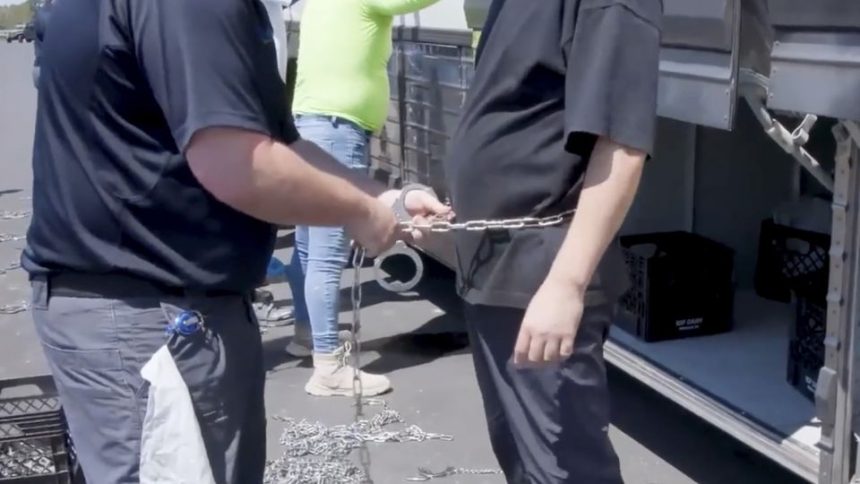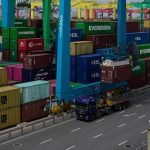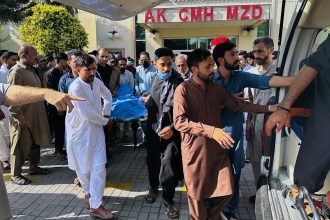“I have everything (in order), I have no reason to rush,” Luz Dary Suárez’s husband told her over the phone during Thursday’s surprise immigration raid at a Hyundai manufacturing plant a quiet southeast part of Georgia.
Suárez, a migrant from Colombia, had warned her husband about the massive immigration enforcement raid that she had heard was going down at the plant. But he had reassured her that he would be OK as he had a valid permit to work in the US.
Despite this, he was detained and remains in the custody of US immigration authorities, awaiting a review of his case, like other workers at the plant who said that their status in the US was not taken into consideration by authorities during the raid.
More than 500 federal, state and local agents participated in the operation that ended with the arrest of 475 people in Ellabell, approximately 25 miles west of Savannah, Georgia. The small community was shaken by what was the largest raid so far in the Trump administration’s ongoing immigration crackdown on US workplaces.
ICE officials said officers spoke with each worker to determine who was in the US legally, and that some were allowed to leave. But family members interviewed by CNN say that people with valid work permits were among those arrested.
Suárez, who arrived in the country with her partner and two children almost two years ago said she has an asylum application pending with US immigration authorities. But according to her husband, who didn’t want to give his full name – the agents refused to take his documents into account before detaining him.
Santiago, another Colombian migrant also asked not to give his full name when he spoke to CNN, found himself in a similar situation after his wife, Camila, originally from Venezuela, was arrested in the ICE raid.
Camila had told her husband that while they were taking a break, the ICE teams “arrived unexpectedly, and detained them.”
“They stormed the place, detaining everyone, no matter who they were,” Camila had told him.
Santiago, who had worked at the plant in the past and knew the hiring procedures well, told CNN, that everyone trying to get a job has to show legal documentation before they can start work.
“My wife told me that when they were processing her, they asked each person what documentation they had.”
But Santiago says that when Camila showed them her documents, the officer in charge marked her paperwork saying she had “nothing” and sent her to the ICE detention bus.
Their accounts concur with that of Mauricio, another migrant who asked not to give his full name and whose wife has been detained since the raid.
“They were calm because her and her brother had their documents in order,” Mauricio told CNN. But he said when the ICE agents arrived, they quickly ran over to people, and “they didn’t accept any documents.”
“Even though they were able to verify them, they were told that nothing was valid, that they would all be arrested,” Mauricio said.
CNN has reached out to Immigration and Customs Enforcement (ICE) over the documentation checks conducted during the raid and asked for comment on the claims of family members.
A Hyundai spokesperson told CNN that they do not believe any of those arrested were directly employed by Hyundai Motor Company.
“Hyundai is committed to full compliance with all laws and regulations in every market where we operate. This includes employment verification requirements and immigration laws,” the company said in a statement Friday. It also said an investigation will be conducted to verify that suppliers and subcontractors are complying with the law.
The Hyundai Metaplant electric vehicle manufacturing facility in Ellabell, Georgia, US, on Friday, Sept. 5, 2025. – Parker Puls/Bloomberg/Getty Images
A plant employee previously told CNN that during the inspection, that officers gave some workers a piece of paper permitting them to leave the plant.
Video footage obtained by CNN showed masked and armed officers issuing orders to workers wearing helmets and safety vests as they lined up and authorities raided the facility. The operation led to workers trying to flee the scene.
Mauricio says his wife didn’t give in to that despair and felt reassured by having a work permit. “But she was dismayed when they told her none of it would be valid,” he said.
All 475 people taken into custody were illegally in the US, said Steven Schrank, the special agent in charge of Homeland Security Investigations in Georgia and Alabama, saying some had crossed into the US illegally, some had visa waivers and were prohibited from working, and some had overstayed their visas, he said.
Santiago says this is “totally false,” not only because of his wife, but also because he claims to know of other colleagues with valid work permits who were also detained.
The majority of those held are South Korean nationals, Schrank said, adding he did not have a breakdown of the nationalities of those arrested. Over 300 of the people arrested were South Korean, the country’s Foreign Affairs Minister Cho Hyun said on Saturday.
Santiago estimates that between 70 and 80% of the plant’s workers were South Korean. “They were in charge of doing everything. Communication was 70% in Korean, 20% in English, and 10% in Spanish,” he noted. He also claims that many of the plans and instructions were in Korean, which could make communication difficult. Mauricio said that “it was always a mystery” to know why there were so many Koreans at the plant.
Many of the Koreans at the site are construction workers or skilled technicians, James Rim, president of the Korean-American Association of Southeast Georgia, says. “We just want to make sure their situation is handled legally and that they are respected,” he told CNN.
A dramatic wait
The weekend lengthened the processing times for those detained, further prolonging the anguish for families.
Suárez, who left Colombia due to threats her family received following the death of a niece, said she is reflecting on her decision to live in the US.
“It seems unfair because you try to do things right, come to work, to try to protect your family. We did things right. … I’m at risk even if everything is in order, and children end up being left adrift,” she said, holding her two children in her arms, to whom she tells them their father “is traveling” for a while.
Mauricio says his wife, who was displaced in Colombia by guerrilla violence, has never been away from her kids for this long. Even when they speak over the phone, he says, the calls are short because she quickly bursts into tears.
“She’s quite devastated; they make her feel like a criminal,” he said. However, he’s not sure he’ll visit her at the detention center. “I’m afraid I could be arrested too, and my children would be left helpless.”
Santiago says he has no one else in the country and plans on waiting for the outcome of his wife’s case as long as possible. And even though he says he has no regrets about coming to the US, it is “possibly” time to leave.
“We aren’t here to be chased; we don’t live off government (handouts), we live off our work. To go out and be chased, it can’t be this way,” he added.
For more CNN news and newsletters create an account at CNN.com









